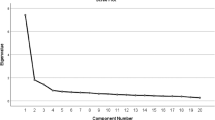Abstract
The relationship between interpersonal cognitive problem-solving skills and social competence in middle childhood was examined taking into account mental age, socioeconomic status, and impulsivity. Sixteen clinically referred preadolescents were compared with 32 normal youngsters of the same age. Social adjustment was measured by the Achenbach Child Behavior Cheklist (1978a) and Teacher Report Form (Edelbrook & Achenback, 1984), and problem-solving was measured by the Children's Means-Ends Problem-Solving Procedure (Platt & Spivak, 1975). Problem-solving was evaluated on six qualitative dimensions, the total mean of the six dimensions for six stories, and consistency across the stories. The socially well adjusted subjects were better problem solvers overall and, in particular, were more effective and appropriate and less aggressive. The data support the efficacy of qualitative assessment of problem solving.
Similar content being viewed by others
References
Achenbach, T. M. (1978a). The Child Behavior Profile: I. Boys 6–11.Journal of Consulting and Clinical Psychology, 46, 478–488.
Achenbach, T. M. (1978b). Psychopathology of childhood: Research problems and issues.Journal of Consulting and Clinical Psychology, 46, 759–776.
Achenbach, T. M., & Edelbrook, C. S. (1979). The Child Behavior Profile: II Boys aged 12–16 and girls aged 6–11 and 12–16.Journal of Consulting and Clinical Psychology, 47, 223–233.
Asarnow, J. R., & Callan, J. W. (1985). Boys with peer adjustment problems: Social cognitive processes.Journal of Consulting and Clinical Psychology, 53, 80–87.
Blishen, B., & McRoberts, H. (1976). A revised socioeconomic index for occupations in Canada.Canadian Review of Sociology and Anthropology, 13, 71–79.
Dodge, K. A., McClaskey, C. L., & Feldman, E. (1985). Situational approach to the assessment of social competence in children.Journal of Consulting and Clinical Psychology, 53, 344–353.
Edelbrook, C., & Achenbach, T. M. (1984). The teacher version of the Child Behavior Profile: I Boys aged 6–11.Journal of Consulting and Clinical Psychology, 52, 207–217.
Fischler, G. L., & Kendall, P. C. (1988). Social cognitive problem-solving and childhood adjustment: Qualitative and topological analyses.Cognitive Therapy and Research, 12, 133–153.
Fischler, G. L., Kendall, P. C., & Vye, C. (1982).Qualitative scoring procedure for interpersonal cognitive problem-solving (ICPS) measures. Minneapolis: University of Minnesota.
Guerra, N. G., & Slaby, R. G. (1989). Evaluative factors in social problem-solving by aggressive boys.Journal of Abnormal Child Psychology, 17, 277–289.
Hopper, R. B., & Kirschenbaum, D. S. (1985). Social problem-solving and social competence in preadolescents: Is inconsistency the hobgoblin of little minds?Cognitive Therapy and Research, 9, 685–701.
Kagan, J., Rosman, B. L., Day, D., Albert, J., & Phillips, W. (1946). Information-processing in the child: Significance of analytic and reflective attitudes.Psychological Monographs, 78(1, Whole No. 578).
Kendall, P. C., & Braswell, L. B. (1993).Cognitive-behavioral therapy for impulsive children (2nd ed.) New York: Guilford Press.
Kendall, P. C., & Fischler, G. L. (1984). Behavioral and adjustment correlates of problem-solving: Validational analyses of interpersonal cognitive problem-solving measures.Child Development, 55, 879–892.
McClure, L. F., Chinsky, J. M., & Larcen, S. W. (1978). Enhancing social problem-solving performance in an elementary school setting.Journal of Educational Psychology, 70, 504–513.
Platt, J. J., & Spivack, G. (1975).Measures of interpersonal problem-solving for adults and adolescents. Philadelphia: Hahnemann Community Mental Health/Mental Retardation Center.
Richard, B. A., & Dodge, K. A. (1982). School maladjustment and problem-solving in school-aged children.Journal of Consulting and Clinical Psychology, 50, 226–233.
Sattler, J. (1989).Assessment of children. San Diego: Author.
Shure, M. B., & Spivack, G. (1972). Means-ends thinking, adjustment and social class among elementary school-aged children.Journal of Consulting and Clinical Psychology, 38, 348–353.
Shure, M. B., Spivack, G., & Jaeger, M. (1971). Problem-solving thinking and adjustment among disadvantaged preschool children.Child Development, 42, 1791–1803.
Spivack, G., Platt, J. J., & Shure, M. B. (1976).The problem-solving approach to adjustment, San Francisco: Jossey-Bass.
Spivack, G., & Shure, M. B. (1974).Social adjustment of young children: A cognitive approach to solving real-life problems. San Francisco: Jossey-Bass.
Wechsler, D. (1974).Wechsler Intelligence Scale for Children:Revised: Manual. New York: Psychological Corporation.
Author information
Authors and Affiliations
Rights and permissions
About this article
Cite this article
Mott, P., Krane, A. Interpersonal cognitive problem-solving and childhood social competence. Cogn Ther Res 18, 127–141 (1994). https://doi.org/10.1007/BF02357220
Issue Date:
DOI: https://doi.org/10.1007/BF02357220




